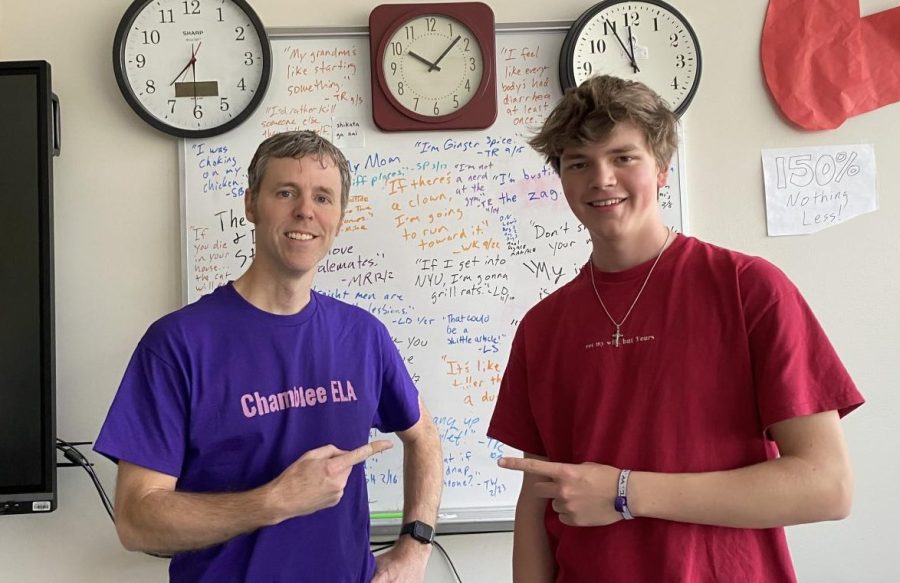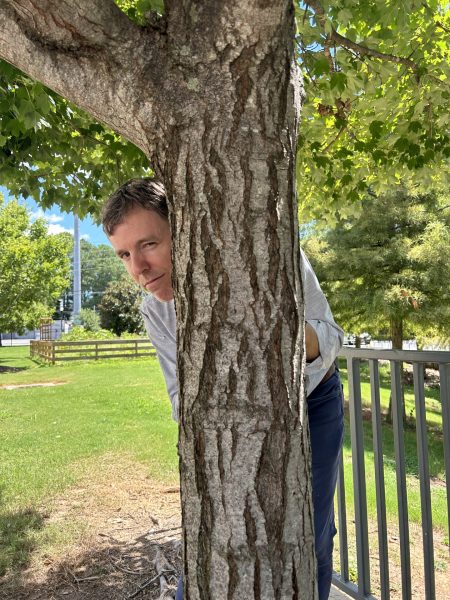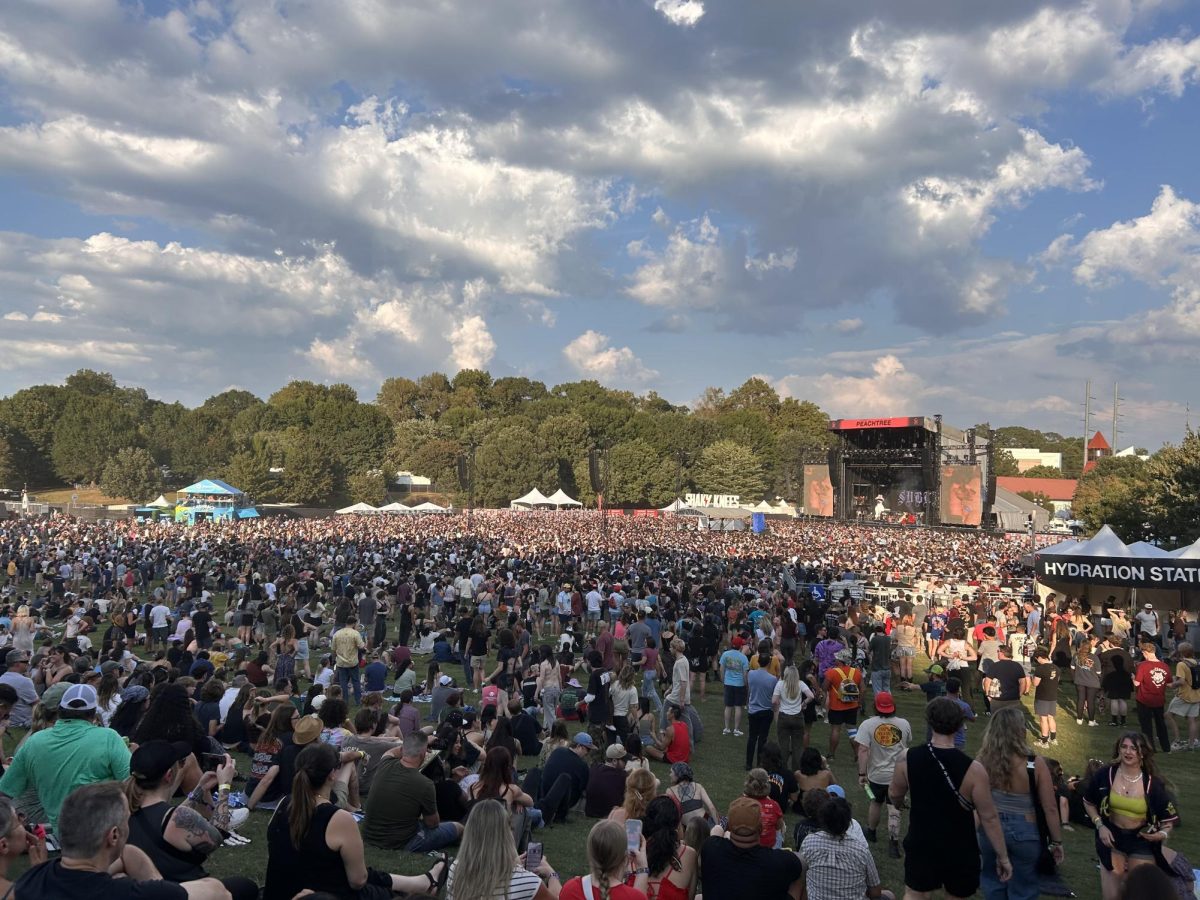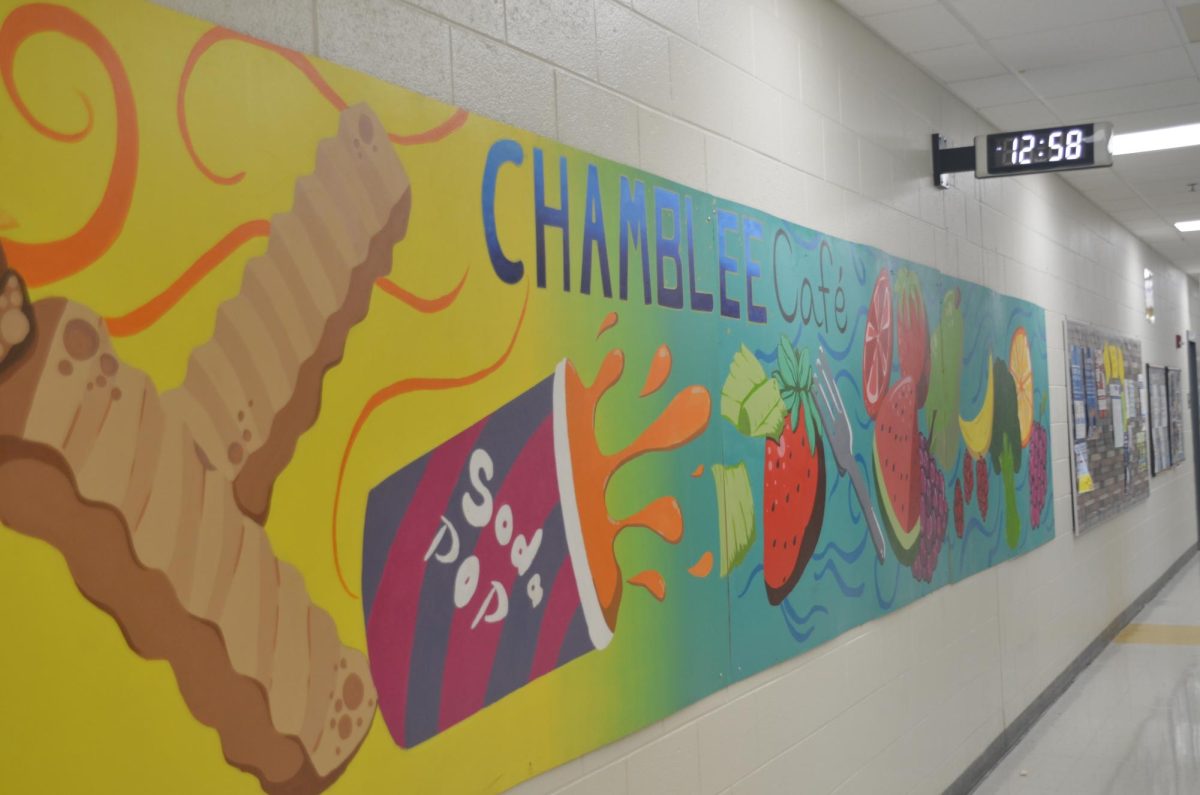STAR Student Scherrer and STAR Teacher Avett Discuss Academics, Memorable Moments, and Underwater Monsters
STAR Teacher Fred Avett (6’1″) and STAR Student Nathan Scherrer (6’4″) Photo courtesy of Isabella Avett
April 26, 2023
Earlier this year, Nathan Scherrer (’23) was named STAR (Student Teacher Achievement Recognition) Student of Chamblee High School. The title is bestowed each year by the Professional Association of Georgia Educators on the senior who is nominated, is in the top 10 of the class at the end of junior year, and has the highest SAT score. As a result, the STAR Student can name the STAR Teacher, one who has played an out-sized role in the student’s education thus far. This year, Scherrer named his AP Research teacher, Fred Avett, as his STAR Teacher. On February 10, the two were also named as STARs for DeKalb County at a luncheon hosted by the Decatur Rotary Club.
Rather than being interviewed by others, Scherrer and Avett each prepared five questions for the other and recently sat down to ask and answer each other’s queries.
AVETT: The SAT is a high-stakes test, yet you did very well. How did you prepare for it?
SCHERRER: I took a lot of practice tests and I looked at the questions that I got wrong and why I got them wrong. I used a book, too. I can’t remember what it was called, but it was very helpful. And then Khan Academy and their free tests.
AVETT: How many times did you actually take the SAT?
SCHERRER: I took it twice. The first time I didn’t really prepare all that much, and the second time I did. And I did a lot better.
SCHERRER: What were your two most memorable teaching moments — best and worst?
AVETT: I think that one of my favorite teaching moments happened my first year teaching when I was in Brooklyn and there was a student named Yadira in one of my tenth grade literature classes. I had asked a question, one of those where there is no right or wrong answer, but a tenth grade level question that requires interpretation and connecting dots. And after a minute or two of batting around some ideas, a student asked me what the answer was. I said, “I don’t know.” And Yadira spoke up, “well, if you don’t know the answer why are you asking us?” I said, “well, that’s kinda the point. If you are asking questions that you already know the answer to, you aren’t really asking a question. You should always ask questions when you don’t know an answer, and you should try to figure out what the answer is.” That’s kind of the point of education. And oftentimes, as you know from AP Research, answering a question often leads to new questions. That was the first moment coming out of student teaching when I was able to capture the purpose of education in a classroom.
As for one of the worst, it also happened in Brooklyn. I had a student who made a very anti-Semitic comment during class. I had to check him: take him out in the hall, make sure he understood what he had just said about a very large group of people. And he did. He knew what he was saying. I said, “So you are going to write off a segment of our population based solely on religious beliefs and wish ill on them and their loved one?” And he was like, “yeah.” So I started asking him how he felt about other groups of people based on nationality, sexuality and race. And he clearly had a lot of problems with a lot of people. It was obviously something he had learned from home. When you encounter that as a teacher, you can’t always change their mind, but you have to say something. You have to stand up when evil is in the room.
AVETT: You are going to Georgia Tech later this year. Why did you choose Georgia Tech over other options for college?
SHERRER: It came down to proximity. I am involved with a camp that I volunteer with throughout the year and I want to be able to keep doing that. I have friends here and my family is here. I’m familiar with Georgia Tech, and it’s a good school. It just felt right, too. Both my parents went there and I have been to the campus multiple times.
AVETT: Are you thinking about a major?
SCHERRER: I’m going to do business, probably with a specialty in leadership and organizational change.
SCHERRER: What is your favorite part about teaching?
AVETT: When the Covid pandemic began and we went virtual, it very much became clear to me that what I very much like about teaching is the performative aspect of it, being in front of a very small audience five times a day, five days a week. And always starting classes by asking what questions or comments the students have, anything we need to talk about, that open space so if there’s something on your mind we can talk about it. Sometimes there is and sometimes there isn’t, and then we get into the lesson. And staying mentally on my toes with a batch of students no matter who they are, what level they are, how old they are — you never quite know what they’re going to do or not do.
As a teacher, I think you try to prepare for that. OK, this is how class is supposed to go, this is the end goal, if this happens then we’ll go here, or if we run out of time we’ll do this or cut that. But all that planning can go out the window quickly. And if there is some pressing issue out there that students want to talk about, often that discussion can be tied back to our lesson or unit. That back-and-forth with an audience is super important to me.
To lose that during the pandemic was just… I was adrift. And even coming back post-pandemic there’s been such a sea change with students almost across the board where they come into the classroom, sit down, open their laptops and start looking at things, or doing something on their phones, and they all have airpods in. They think they can multitask now. It is better this year. There is more engagement and willingness to talk and react, to engage with the real world for a bit.
AVETT: What important skill or experience do you think you gained by taking the AP Capstone classes (Seminar and Research)?
SCHERRER: I think how to research, I guess. Like investigating something that you’re interested in and how to approach that and think about it. And what resources I can use and how to use those.
SCHERRER: If you could research anything for an AP Research project, what would you research?
AVETT: I think I have interests all over the place, but one of my lifelong passions that I think I would actually want to spend months pursuing would be sea monsters and lake monsters. I grew up obsessed with the Loch Ness Monster and stories of the Kraken and other creatures that may have existed in the ocean that maybe we don’t have anymore or that may have just been floating seaweed or people’s crazy stories. To research the history and origin of those things would be fascinating. Or else the tradition of free music in Japan in the 20th Century. The lack of notation and lack of structure that started as a kind of performance art and became musical in nature and tapped into some elements of jazz and rock in the 1960s and 1970s. There were some amazing musicians – or artists – that didn’t seem to have any previous analogue that I’ve been able to find. That’s a kind of music that I really enjoy, so why not spend time immersed in that.
SCHERRER: Sounds like fun.
AVETT: Could be.
AVETT: What do you think you will miss most about Chamblee High School once you exit? If anything at all.
SCHERRER: It’s nice to have a community that I’ve been with for the last six years. Everyone kind of knows everybody. You can start a conversation with anyone. I’ll definitely miss that. But everything else I think I’ll find in college – like teachers who are really good and care about students and clubs and organizations.
SCHERRER: What is the best quote you have heard in your classroom?
AVETT: Oh boy. It’s hard to narrow that down. I guess for context for this interview I should note that when a student says something that just sounds crazy either in context or out of, I jot it down on the white board because then other classes come in and say “wait a second, what does that mean?” Sometimes I know the context, and sometimes I just hear things said. To have a quote on the board that says “It’s probably illegal how many children I’ve murdered” sounds pretty bad, but I also know what that student was talking about and know that it’s actually pretty funny. That’s from this year.
Occasionally a quote will end up on a t-shirt at the end of the year. I have to go back to pre-pandemic times when Wendy’s had dropped a mixtape (in 2018) that included a diss track about Burger King or something like that. And there was a conversation about that at the end of a class, and then when it died down Chris Rogers (’18) said, “They do have good food though. I’m not gonna lie. On God, that Baconator go crazy.” That was such a crazy line, I wrote it on the board, and a few weeks later we printed some shirts that said “On God, that Baconator go crazy.”
AVETT: Ok, you play guitar. Tell me about your favorite guitarists and why you like them.
SCHERRER: It’s all over the board, and it changes every month. Right now it’s alternative rock artists like Hozier and Mt. Joy’s guitarist. On the other end, it’s like classic rock like David Gilmore [of Pink Floyd]. I was into blues for a while like Stevie Ray Vaughn and B. B. King. I’m normally not following a guitarist so much. If I hear a song and it sounds cool, I learn it. I am part of a band, but we don’t have a drummer. Normally, I’m playing by myself. I started during Covid. I had nothing to do and I don’t like having nothing to do and being lazy, so I picked up a guitar and played a lot. It’s calming and fun.
SCHERRER: If you had to have a go-to joke for every situation what would it be?
AVETT: The joke that I tell every year — probably in every class — is a joke that I heard when I was probably younger than you are on a TV show. Someone bought the rights to a Morphin Power Rangers type show from Japan, and had dubbed English over it and made it very funny. They added ’80s rock as the soundtrack, too. That’s what I saw. And at the end of one of the episodes there was this robot guy who was in charge of maintaining their secret base and he told this joke that went: these two lizards walk into a bar and sit down at the bar and start looking over the menu. The bartender sees the two lizards come in, and he finishes up cleaning glasses and then walks over to where the two lizards are looking at the menu. And the bartender says to the lizards: “You know, we don’t get many of you kind in this establishment.” And one of the lizards looks up from the menu and says to the bartender: “Well, at these prices, I’m not surprised.”
SCHERRER: [does not laugh] That’s a good one.












Toby Russell • May 5, 2023 at 2:54 pm
I would’ve laughed. Maybe
Hannah Choy • Apr 26, 2023 at 4:46 pm
[does not laugh] lol
Mr. Avett, we appreciate your AP Research jokes 😀